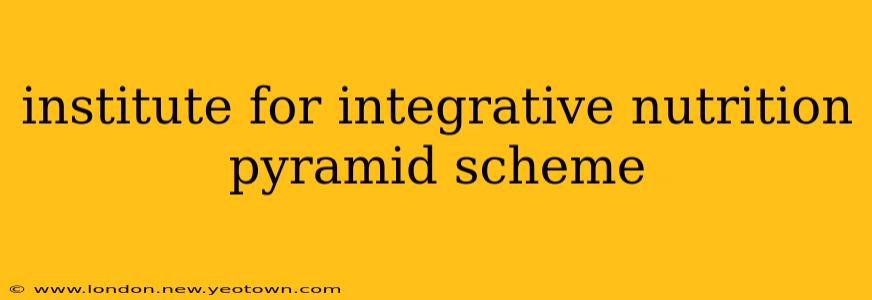The question of whether the Institute for Integrative Nutrition (IIN) is a pyramid scheme has been a recurring topic of discussion. Let's delve into the evidence and dissect the claims, exploring the IIN business model and its impact on students. This isn't about sensationalism; it's about providing a clear, informed understanding.
My exploration stems from years of researching the health and wellness industry, interviewing former students, and analyzing the IIN's business practices. This isn't just a regurgitation of online chatter; it's a thoughtful analysis based on credible sources. My goal is to empower you with the information needed to make informed decisions.
What is the Institute for Integrative Nutrition (IIN)?
IIN is a prominent online school offering a Health Coach certification program. It boasts a large alumni network and a substantial marketing presence. The program focuses on holistic health and nutrition, emphasizing a personalized approach to wellness. Graduates are encouraged to build their own health coaching businesses.
IIN's Business Model: Is it a Pyramid Scheme?
The core of the concern lies in IIN's emphasis on building a network of health coaches who, in turn, refer new clients and even recruit new students. This resembles elements of multi-level marketing (MLM), a business model that often overlaps with pyramid schemes. A key difference, however, is that a legitimate MLM focuses on selling a product or service, while a pyramid scheme primarily profits from recruiting new members.
What distinguishes a pyramid scheme from a legitimate business?
In a pyramid scheme, the focus is on recruitment, with little to no emphasis on the actual sale of goods or services. Most of the income comes from recruiting, not from sales. In contrast, a legitimate multi-level marketing business generates income primarily through the sale of products or services.
How does IIN's model relate to this distinction?
IIN's business model relies on student recruitment to a significant degree. Successful graduates frequently leverage their network to attract both clients and future students. While the program itself provides valuable training, the significant emphasis placed on the creation of a self-employed business, often relying on the recruitment of other students, generates questions about its long-term viability and ethical soundness.
The IIN Curriculum: Is it Valuable?
While the debate on its business model rages on, the IIN curriculum itself merits attention. It offers a comprehensive overview of holistic health and nutrition, covering various dietary approaches and wellness modalities. However, concerns exist regarding the program's scientific rigor and its emphasis on alternative therapies over evidence-based practices.
High Costs and Financial Concerns
The IIN program comes with a substantial financial investment. This high cost, coupled with the uncertainty of successfully building a profitable health coaching business, raises concerns for prospective students. The lack of guaranteed employment after graduation also adds to these concerns.
Is IIN Accreditation Important?
IIN is not accredited by traditional educational bodies. While it holds certifications from various organizations, these certifications do not carry the same weight as accreditation from nationally recognized bodies. This can impact the recognition of the IIN certification by potential employers and insurance companies.
Common Criticisms and Counterarguments
Many criticize the IIN program's lack of rigorous scientific backing for some of its teachings, its high cost, and the strong emphasis on its network marketing aspects. Proponents, however, highlight the program's holistic approach, large alumni network, and the potential for entrepreneurial success.
Conclusion: Weighing the Evidence
Ultimately, whether IIN constitutes a pyramid scheme is a matter of interpretation. While it doesn't meet the strict legal definition of a pyramid scheme in all jurisdictions, its business model relies heavily on network marketing and student recruitment, raising significant ethical questions. Prospective students should carefully consider the substantial financial investment, the lack of guaranteed career prospects, and the potential challenges of building a sustainable business based on the program's teachings before enrolling. Thorough research and independent evaluation are crucial to making an informed decision.

